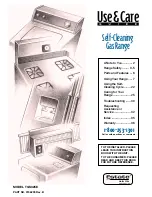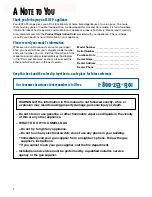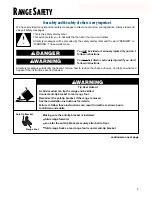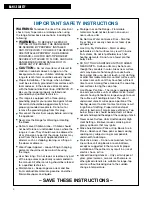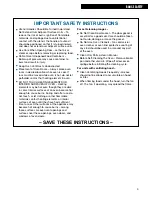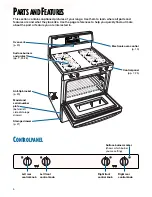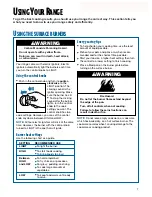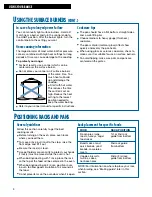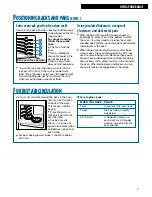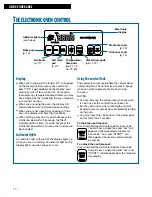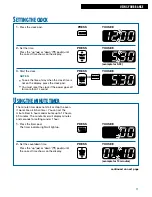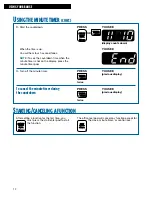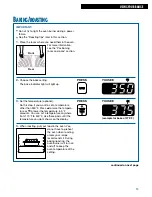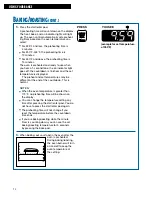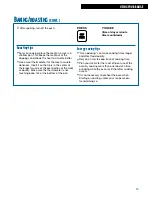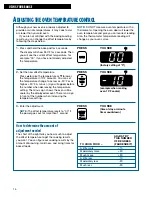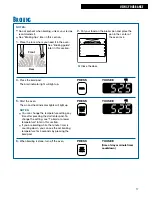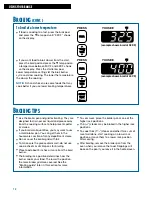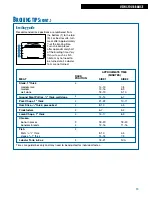
4
RANGE SAFETY
– SAVE THESE INSTRUCTIONS –
IMPORTANT SAFETY INSTRUCTIONS
WARNING:
To reduce the risk of fire, electrical
shock, injury to persons, or damage when using
the range, follow basic precautions, including the
following:
•
WARNING –
TO REDUCE THE RISK OF
TIPPING OF THE RANGE, THE RANGE MUST
BE SECURED BY PROPERLY INSTALLED
ANTI-TIP DEVICES. TO CHECK IF THE DEVICES
ARE INSTALLED PROPERLY, SLIDE RANGE
FORWARD, LOOK FOR ANTI-TIP BRACKET
SECURELY ATTACHED TO FLOOR, AND SLIDE
RANGE BACK SO REAR RANGE FOOT IS
UNDER ANTI-TIP BRACKET.
•
CAUTION –
Do not store items of interest to
children in cabinets above a range or on the
backguard of a range – children climbing on the
range to reach items could be seriously injured.
•
Proper Installation – The range, when installed,
must be electrically grounded in accordance with
local codes or, in the absence of local codes,
with the
National Electrical Code, ANSI/NFPA 70.
Be sure the range is properly installed and
grounded by a qualified technician.
•
This range is equipped with a three-prong
grounding plug for your protection against shock
hazard and should be plugged directly into a
properly grounded receptacle. Do not cut or
remove the grounding plug from this plug.
•
Disconnect the electrical supply before servicing
the appliance.
•
Never Use the Range for Warming or Heating
the Room.
•
Do Not Leave Children Alone – Children should
not be left alone or unattended in area where the
range is in use. They should never be allowed to
sit or stand on any part of the range. Injuries may
result from the misuse of appliance doors or
drawers such as stepping, leaning, or sitting on
the doors or drawers.
•
Wear Proper Apparel – Loose-fitting or hanging
garments should never be worn while using
the range.
•
User Servicing – Do not repair or replace any part
of the range unless specifically recommended in
the manual. All other servicing should be referred
to a qualified technician.
•
Maintenance – Keep range area clear and free
from combustible materials, gasoline, and other
flammable vapors and liquids.
•
Storage in or on the Range – Flammable
materials should not be stored in an oven or
near surface units.
•
Do Not Use Water on Grease Fires – Smother
fire or flame or use dry chemical or foam-type
extinguisher.
•
Use Only Dry Potholders – Moist or damp
potholders on hot surfaces may result in burns
from steam. Do not let potholder touch hot
heating elements. Do not use a towel or other
bulky cloth.
•
DO NOT TOUCH SURFACE UNITS OR AREAS
NEAR UNITS – Surface units may be hot even
though they are dark in color. Areas near surface
units may become hot enough to cause burns.
During and after use, do not touch, or let clothing
or other flammable materials contact surface units
or areas near units until they have had sufficient
time to cool. Among those areas are the cook-top
and surfaces facing the cook-top.
•
Use Proper Pan Size – The range is equipped with
one or more surface units of different size. Select
utensils having flat bottoms large enough to cover
the surface unit heating element. The use of
undersized utensils will expose a portion of the
heating element to direct contact and may result
in ignition of clothing. Proper relationship of
utensil to burner will also improve efficiency. Top
burner flame size should be adjusted so it does
not extend beyond the edge of the cooking utensil.
•
Never Leave Surface Units Unattended at High
Heat Settings – Boilover causes smoking and
greasy spillovers that may ignite.
•
Make Sure Reflector Pans or Drip Bowls Are in
Place – Absence of these pans or bowls during
cooking may subject wiring or components
underneath to damage.
•
Protective Liners – Do not use aluminum foil to
line surface unit drip bowls or oven bottoms,
except as suggested in the manual. Improper
installation of these liners may result in a risk of
electric shock, or fire.
•
Glazed Cooking Utensils – Only certain types of
glass, glass/ceramic, ceramic, earthenware, or
other glazed utensils are suitable for range-top
service without breaking due to the sudden
change in temperature.
Summary of Contents for TGS325E W
Page 33: ...33 NOTES ...
Page 34: ...34 NOTES ...

